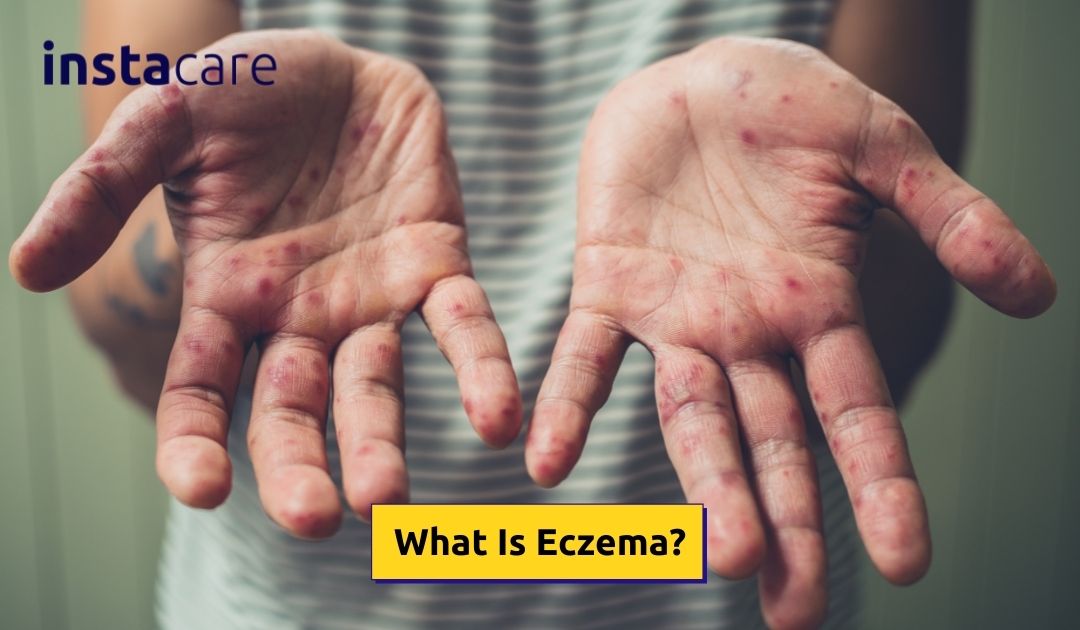Skin conditions are often bothersome and eczema is one of them. It may make you feel uncomfortable. Eczema, also known as atopic dermatitis, is an inflammatory condition that turns your skin red and itchy. In some people, it may even cover large patches of the body. However, they may heal and get back to normal. It is a long-term, lifelong condition with no such cure. The attacks may flare up and settle over time. However, symptoms can be managed with supportive treatment. Also, some lifestyle habits can help in coping up with the disease. It may be accompanied by other inflammatory conditions like asthma and hay fever.
However, it is not contagious. It does not spread through touch because it occurs due to an abnormality in your immune system, rather than an attack of a parasite.
What are the Symptoms of Eczema?
The signs and symptoms of eczema may differ from person to person and level of inflammation. In some, it may affect large patches, while in some, it may only cover little patches. The signs and symptoms of eczema are;
Red or brown skin that most usually attacks the hands, feet, ankles, wrists, neck, upper chest, eyelids, inside the bend of the elbows and knees, and in infants, the face and scalp
- Itchiness of skin
- Small red bumps that may leak fluid upon stretching
- Thickened, cracked, scaly skin
- Raw and sensitive skin
- Swollen skin from scratching
If you suffer from these symptoms and you want to consult with the best Dermatologist in Islamabad, book an appointment through InstaCare.
View More: How to Get Rid Of Parasites Naturally
What are the Causes of Eczema?
Generally, healthy skin retains moisture and protects you from germs like bacteria. But the skin with eczema tends to lose all its moisture and makes you vulnerable to irritants, allergens, and bacteria. Mostly it travels in the family. Having a family history of eczema, asthma, and hay fever can be a primary risk factor for atopic dermatitis.
What are the Complications of Eczema?
Atopic dermatitis is an inflammatory condition. Left untreated, or if it worsens, it can lead to further complications like;
Asthma or hay fever
Eczema, asthma, and hay fever are related to each other in that they are inflammatory diseases. If inflammation due to eczema worsens, it can result in asthma and hay fever too. Therefore, many children having eczema have asthma and hay fever too.
Neurodermatitis
Neurodermatitis is a condition in which raised rough patches of skin to occur due to chronic itching and scaly skin. Eczema, when worsen, can lead to neurodermatitis. The patch becomes worse because you keep scratching it because of severe itch and prolonged habit.
Skin infections
Eczema leads to itching and eventually scratching, leading to cracks and breaks in your skin. Which eventually increases the risk of getting a bacterial, viral, or fungal infection of the skin. If you are having any skin disorder book an appointment with the best dermatologist in Lahore through InstaCare.
Irritant hand dermatitis
People who keep their hands wet or their job demands to keep them wet or wash with soap quite frequently can get irritant hand dermatitis.
Sleep problems
Eczema can interfere with your sleep cycle as it causes a constant itch. However, if you apply the medications on time, the itch can be reduced which can help in sleeping better.
How Can You Prevent Eczema?
To prevent eczema, you must apply the medications on time. Along with it, the following tips can help prevent it.
- Keep your skin moisturized. Make sure you apply a cream or moisturizer that is gentle to your skin and keeps your skin hydrated. Since dry skin exacerbates eczema, keeping it moisturized eventually helps in lowering its exacerbations. You can also apply oils like olive oil or coconut oil that keep it moisturized for a long time.
- Identify the triggers that worsen your eczema attack and try to avoid them. They can be anything like any particular kind of soap, lotion, stress, obesity, or dust.
- Take baths for a short time and use warm water instead of hot. Using hot water turns your skin dry and flaky, eventually exacerbating an eczema attack.
Conclusion
Eczema, also known as atopic dermatitis, is an inflammatory condition that turns your skin red and itchy. In some people, it may even cover large patches of the body. However, they may heal and get back to normal. It is a long-term, lifelong condition with no such cure. The signs and symptoms of eczema may differ from person to person and level of inflammation. In some, it may affect large patches, while in some it may only cover little patches. If you have a complaint of eczema, you can visit the best dermatologist in Pakistan through InstaCare.











